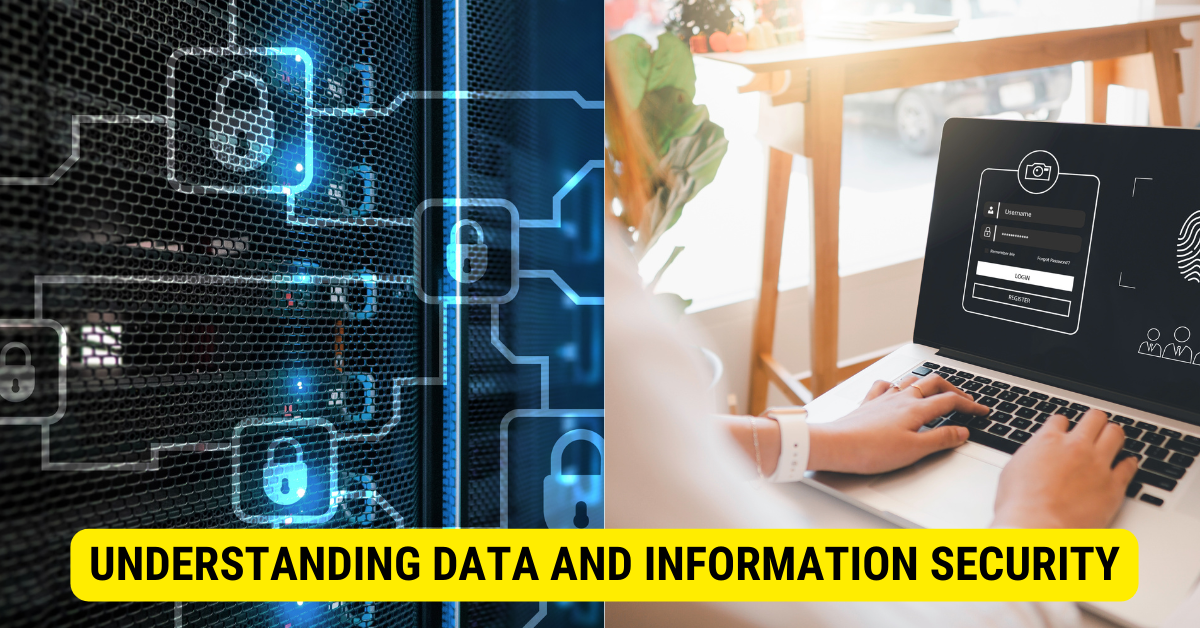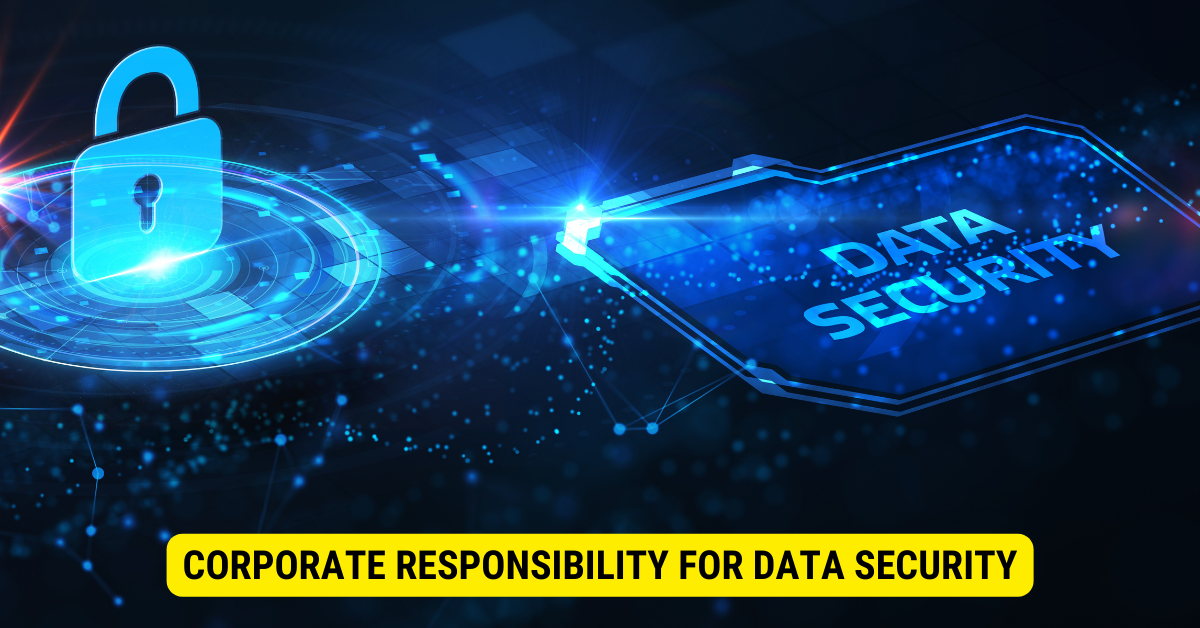Both individuals and organizations are responsible for the security of data and information stored on computers. This includes the device’s owner, the software and service providers, and sometimes third-party security providers.
In the digital age, where our lives are increasingly intertwined with technology, the security of data and information stored on computers has become a paramount concern. But who exactly is responsible for safeguarding this valuable asset? In this article, we will explore the various entities and individuals that play a role in ensuring data security and delve into their responsibilities.
Understanding Data and Information Security
 Data and information security protect sensitive or confidential data from unauthorized access, use, disclosure, disruption, modification, or destruction. It encompasses measures taken to prevent data breaches, cyberattacks, and theft. With the increasing occurrence and sophistication of cyber threats, understanding the importance of data security has never been more crucial.
Data and information security protect sensitive or confidential data from unauthorized access, use, disclosure, disruption, modification, or destruction. It encompasses measures taken to prevent data breaches, cyberattacks, and theft. With the increasing occurrence and sophistication of cyber threats, understanding the importance of data security has never been more crucial.
The Importance of Data Security
Data security is of paramount importance for several reasons. Firstly, it helps to maintain the privacy of individuals and organizations by protecting sensitive information such as financial records, personal details, and proprietary business data. This includes safeguarding personally identifiable information (PII) like social security numbers, addresses, and credit card facts. By implementing robust data security measures, organizations can ensure this sensitive information remains intimate and inaccessible to unauthorized individuals.
Secondly, data security ensures the integrity and reliability of information, safeguarding it from unauthorized alterations or corruption. This is particularly important in industries such as healthcare and finance, where accurate and unaltered data is critical for making informed decisions. By implementing data integrity controls and safeguards, organizations can ensure that data remains accurate, consistent, and trustworthy.
Lastly, data security helps to maintain trust and confidence among stakeholders, including customers and business partners. In an era where data breaches and cyberattacks are making headlines regularly, organizations prioritizing data security demonstrate their commitment to protecting the interests of their stakeholders. This can help build and maintain strong relationships with customers, partners, and investors, ultimately contributing to the long-term success and sustainability of the group.
Key Terms in Information Security
Before diving into the responsibilities related to data security, it is essential to understand key terms in information security. These terms provide a foundation for understanding the various aspects of data protection and the measures taken to ensure its security.
- Confidentiality: Safeguarding that data is only accessible to authorized individuals or entities. Confidentiality measures include access controls, encryption, and secure storage to prevent unauthorized access or disclosure of sensitive information.
- Integrity: Maintaining the accuracy and trustworthiness of data through controls and safeguards. Integrity measures include data validation, checksums, and audit trails to detect and prevent unauthorized modifications or data corruption.
- Availability: Ensuring that data and information are accessible when needed. Availability measures include redundancy, backup systems, and disaster recovery plans to minimize downtime and ensure continuous access to critical data.
- Authentication: Verifying the identity of users or devices before granting access. Authentication measures include passwords, biometrics, and multi-factor authentication to ensure that only authorized individuals or devices can access sensitive data.
- Encryption: Converting data into a coded form to prevent unauthorized access. Encryption uses algorithms and keys to scramble data, making it unreadable to illegal individuals. This ensures that data remains protected and confidential even if it is intercepted.
By understanding these key terms, individuals and organizations can gain a deeper appreciation for the difficulties of data and information security. Implementing appropriate security measures based on these concepts is crucial for safeguarding sensitive data and mitigating the risks associated with unauthorized access or disclosure.
Individual Responsibility for Computer Security
While organizations and governments have a significant role in data security, individual users are also responsible for protecting their data. Users must understand their role in safeguarding their personal information and taking proactive events to ensure the security of their digital assets.
Role of the User in Protecting Data
Regarding computer security, individuals are the first line of defense. Users should be mindful of the following best practices to protect their data:
- Make strong, unique passwords for all accounts and change them regularly. A strong password consists of a combination of majuscule and lowercase letters, numbers, and special characters. Avoid using easily guessable information, such as your name or birthdate.
- Enable two-factor authentication for additional account security. Two-factor confirmation adds an extra layer of protection by requiring users to provide a second verification form, such as a sole code sent to their mobile device, in calculating their password.
- Regularly update and patch software and operating systems to fix security vulnerabilities. Software updates often hold important security patches that address known vulnerabilities. Keeping your software up to date safeguards that you have the latest security measures in place.
- Avoid clicking on doubtful links or downloading files from untrusted sources. Phishing attacks and malware often rely on users unknowingly downloading malicious files or clicking on deceptive links. Exercise caution and settle the legitimacy of the source before taking any action.
- Back up important data regularly to an external device or cloud storage. Data loss can occur for many reasons, including hardware failure, malware attacks, or accidental deletion. Regularly backing up your data safeguards that you have a copy of your important files in case of an unforeseen event.
Personal Security Measures
Individuals can also take additional security measures to protect their data:
- Install reputable antivirus software and save it up to date. Antivirus software helps detect and remove malware, providing an added layer of protection against various online threats. Regularly updating the antivirus software ensures that you have the latest virus definitions.
- Be cautious when using public Wi-Fi networks, as they can be susceptible to snooping. Public Wi-Fi networks, such as those originating in coffee shops or airports, are often unsecured, making it easier for hackers to intercept sensitive information. Avoid accessing or transmitting sensitive data when connected to public Wi-Fi networks.
- Securely dispose of physical media containing sensitive information. When disposing of physical media, such as old hard drives or USB drives, it is essential to ensure the data is irretrievable. Simply deleting files or formatting the drive may not be sufficient. Consider using specialized software or physically destroying the media to prevent data recovery.
By following these best practices and taking personal security measures, individuals can significantly enhance their computer security and protect their valuable data from unauthorized access or loss.
Corporate Responsibility for Data Security

Companies store vast amounts of sensitive data, making them attractive targets for cybercriminals. Thus, organizations have a vital role in ensuring data security.
The Role of IT Departments

Within businesses, IT departments are primarily responsible for data security. They implement and maintain security measures, including firewalls, access controls, and intrusion detection systems. IT professionals also conduct regular security audits and vulnerability evaluations to identify and address the organization’s infrastructure weaknesses.
Security Policies and Procedures in Businesses
Organizations formulate security policies and procedures to establish a framework for protecting data. These policies define acceptable use of assets, password requirements, incident response protocols, and other security-related guidelines. By ensuring employees are aware of and adhere to these policies, companies can significantly reduce the risk of data breaches caused by internal factors.
Government’s Role in Information Security
Governments are crucial in establishing and enforcing regulations to protect data and information.
Laws and Regulations for Data Protection
Governments have enacted laws and regulations worldwide to govern data protection and privacy. These laws vary in scope and detail but usually mandate certain privacy and security measures for organizations handling personal or sensitive data. Compliance with these rules is necessary to avoid legal repercussions.
Government Agencies Dedicated to Cybersecurity
Many governments have established dedicated agencies or departments responsible for managing and responding to cyber threats. These agencies monitor networks, share threat intelligence, and collaborate with organizations to combat cybersecurity threats. They also educate the public on best practices and provide resources to enhance security.
The Role of Software and Hardware Manufacturers
Software and hardware manufacturers are responsible for ensuring their products’ security and protecting user data.
Security Features in Software and Hardware
Manufacturers must include robust security features in their software and hardware products. These features may include encryption algorithms, secure authentication mechanisms, and firmware updates. By designing products with security in mind, manufacturers help mitigate potential vulnerabilities.
Manufacturer’s Liability in Data Breaches
Manufacturers may be liable for the damages if a data breach results from product vulnerabilities. It is crucial for manufacturers to promptly address any discovered vulnerabilities and provide timely patches or updates to protect users’ data.
Key Takeaways
- Every computer user has a role in ensuring their data’s security.
- Organizations often have IT departments that manage security protocols.
- Software providers should ensure that their applications have built-in security measures.
- Regular updates and patches are crucial to protect against new vulnerabilities.
- Educating oneself about basic cybersecurity practices is essential.
FAQs
Q: Who is primarily responsible for the data on a personal computer?
The owner of the personal computer is primarily responsible.
Q: Do companies have an obligation to secure employee data?
Companies have a legal and ethical obligation to secure employee data.
Q: How can individuals enhance their computer’s security?
By regularly updating software, using strong passwords, and employing reliable antivirus programs.
Q: Are software providers liable for data breaches?
This depends on the jurisdiction, but in many cases, it can be if negligence is proven.
Q: Can third-party security tools offer additional protection?
Many third-party security tools can enhance a computer’s security layers.
Conclusion
The responsibility for data security and information stored on computers is shared among users, organizations, governments, and manufacturers. Each entity plays a vital role in safeguarding data, and collaboration between all parties is essential for maintaining data security in an increasingly interconnected world. By understanding their responsibilities and taking proactive measures, we can collectively mitigate the risks and protect the valuable asset that is data.
